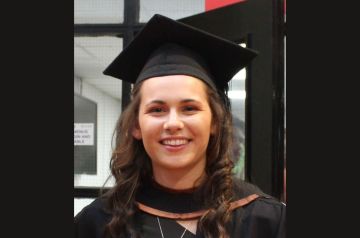This research project will explore advantages and disadvantages of the Irish language to local businesses, and ways to help those businesses expand beyond their Gaeltacht borders
Nadia Blanchfield is one of five researchers from South East Technological University (SETU) to have been awarded funding to pursue research projects under the Irish Research Council (IRC) Enterprise Partnership Schemes.
Bridging Peripheral Business Communities through Native Culture Engagement Leveraging Digital Technologies is the title of Nadia Blanchfield’s project in collaboration with enterprise partner Údarás na Gaeltachta.
National and European development plans regularly refer to the access and use of technology as a catalyst for sustainable rural development. However, the role of technology in rural indigenous business communities is poorly understood.
Challenges for native Irish speakers
To date, rural communities and surrounding businesses have limited access to technology-enabled capability development. Native Irish speakers have an additional challenge as technology specialists may not have proficiency in their native tongue, lowering the potential for optimum technology transfer. Despite these challenges, technology has the ability to bridge the native culture gap and cultivate social ties within and beyond the community.
Nadia’s research project aims to explore the impact of digital technology capability development on Gaeltacht business communities' cultural ties. Her project will examine the advantages and disadvantages of the Irish language to local businesses, opportunities to grow everyday use of the Irish language, and ways to help those businesses expand beyond their Gaeltacht borders and compete at a wider level.
Importance of digital technology
As a graduate from the Bachelor of Business (Hons) with Irish in Waterford, and a fluent Irish speaker, this research project allows Nadia to pursue her passion for her native language and business studies: “Tá an teicneolaíocht dhigiteach ag éirí níos tábhachtaí chun daoine agus gnólachtaí a chur i dteagmháil lena chéile in ainneoin achair fhisiciúil, mar a léiríodh le linn dianghlasála COVID-19. Is cuid lárnach de chultúr na hÉireann iad na ceantair Ghaeltachta agus tá súil agam go gcuideoidh forbairt chumais teicneolaíochta digití, tríd an taighde seo, leis na pobail ghnó tuaithe Gaeilge seo a fhorbairt agus a chothú.
Digital technology is becoming increasingly important in connecting people and businesses despite physical distance, as highlighted during covid-19 lockdowns. Gaeltacht areas are an integral part of Irish culture and it is my hope that the development of digital technology capabilities through this research will help to develop and sustain these rural Irish speaking business communities.”
Competitive Irish Research Council programme
Nadia will commence her research project at SETU Waterford’s School of Business under the supervision of Prof Felicity Kelliher, Department of Management and Organisation, Dr Eugene Crehan, Director of Programmes, Centre for Enterprise Development and Regional Economy (CEDRE), and Dr Seamus Dillion, Head of Dept of Humanities at SETU Waterford.
"I speak on behalf of Nadia's co-supervisors Prof Felicity Kelliher, Dr Seamus Dillon and myself, in stating how proud we are of Nadia in securing the Irish Research Council (IRC) Enterprise Partnership Scheme Postgraduate scholarship, against great competition. This is an acknowledgement of Nadia's deep understanding of the research problem and her research plan to develop new knowledge," said Dr Eugene Crehan.
Údarás na Gaeltachta, CEDRE, and RIKON
This is an action research project that will embed Nadia, the researcher, as an intern in Údarás na Gaeltachta, CEDRE, and RIKON, the hybrid centre of innovation in Business Technology Management at SETU. Nadia will work with the teams to develop and implement a pilot technology-enabled capability development program in liaison with business owners in Gaeltacht na nDéise including An Rinn and An Seanphobal.
Recently, Nadia spent two weeks on the Dingle Peninsula conducting interviews with Gaeltacht business owners in Gaeltacht Chorca Dhuibhne in an attempt to better understand their current levels of digital technology skill and engagement which will help in designing the proposed training intervention central to this action research study.
It is hoped findings of Nadia’s project will advance dynamic capabilities theory and rural business practice, a core objective of Project Ireland 2040.


